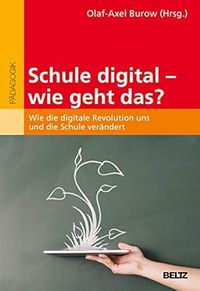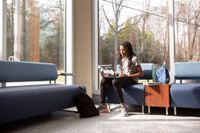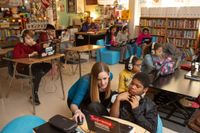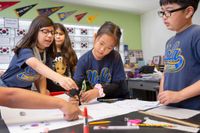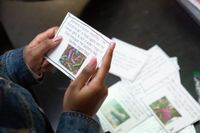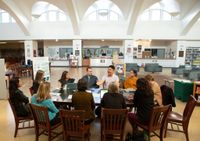Educational Concept
„During the 20th century, we witnessed an enormous advancement in terms of quantity and at the same time an enormous development in the sense of quality.
It is safe to say that the world of the year 2000 differs by far more from the world of the year 1900, as has been the case between the world of the year 1900 and the world of the year 1800.“
Helmut Schmidt
German Federal Chancellor (1974 - 1982)
Bundesarchiv, B 145 Bild-F048808-0011 / Wienke, Ulrich / CC-BY-SA 3.0
„With the ongoing digitalisation of nearly all our areas of life, we currently experience the forerunners of a comprehensive transition, which is powerful enough to change society in an unprecedented extent, so that visionaries with good reason speak about a revolution.
Our modern world is undergoing major changes that affect almost every aspect of our lives. In response to this, new trends and technologies emerge almost every day, especially in the areas of telecommunication, transport, cross-border trade, leisure activities, consumption, personal lifestyle, human interaction as well as changes in our working environment that are particularly relevant today. Our students can only contribute to our modern world in accordance with their individual abilities and skills, participate successfully in it and interact with it in a goal-oriented manner if they are explicitly prepared for these challenges in the school environment.
However, the school system in its current form only reflects this in very few cases - the pedagogy and didactics, the ministries of education and the teaching staff are too tied up in traditional role models and ideas about teaching. A classroom in the 1950s of the last century hardly differs from its appearance today - apart from the fact that the furniture has most likely become more modern and comfortable and the traditional chalkboard has given way to a smartboard in many places, even if the latter is not always used according to its technological capabilities.
The pedagogical concept of the German School Tunis is based on the self-concept of providing students with the necessary skills to meet these complex challenges. The responsibility for this arises from our mission statement, which forms the foundation of both - our educational and school mission.
In order to adequately live up to this commitment, the students at Tunis German School are put into the center of education and schooling. This approach is based on the fundamental assumption that learning processes can only develop successfully through the interchange of freedom and responsibility. The students should be enabled to learn how to deal responsibly with the freedom they are granted and to develop a self-image of responsibility, which enables them to independently shape their learning processes.
Therefore, the pedagogical concept of Tunis German School stipulates that students have the freedom to choose between several approaches to the learning content: depending on personal interest, the individually perceived level of difficulty of a topic or the current need for social interaction. However, this also requires taking responsibility for themselves, because only if this decision is made in the full awareness that your own needs are limited by the concerns and requirements of the outside world, learning processes can take place optimally and the basis for goal-oriented interaction with the world can be created.
In order to achieve these challenging objectives, the following framework conditions for teaching at Tunis German School were completely redefined:
Conception of Space
“Today, school is still a more or less closed space that is isolated from the real world, so that school presents itself as a space of pedagogical power. This means that the children and young people should either be forced to flee the world or be barracked in the standard educational sense. These spatial designs adhere to the inclusion of children and young people in school spaces.”
(Stangl, Lernlandschaft - Online Lexikon für Psychologie und Pädagogik)
Photo by Allison Shelley for EDUimages
- open learning environment instead of closed classrooms.
- age-appropriate design differentiated by grade level.
- the partially open learning site functions as an additional educator.
- a centrally located learning site invites students to group and project work.
- lessons take place in partially open, glazed rooms.
- isolated and quiet retreat areas invite students to work on their own.
Teachers
“The paradigm shift is a constant buzzword in the discussion about change processes in schools. The way in which learning is defined is up for debate, as is the role that teachers and learners play in the learning process. The image of “teaching” as a didactically prepared transfer of knowledge is increasingly being questioned today and as the term changes, the role assigned to teachers also changes.”
(https://lehrerfortbildung-bw.de)
- change roles from conveyors of knowledge to learning companions.
- support individual, active learning processes.
- regularly exchange ideas within the pedagogical team.
- develop and provide materials for individualised learning.
- give appreciative feedback which supports the learning process.
- create a pleasant and communicative atmosphere.
Photo by Allison Shelley for EDUimages
Students
"As a student, being active in learning is good, having a say in your learning is even better, controlling and regulating your learning yourself is best."
(Herbert Gudjons, Neue Unterrichtskultur - Veränderte Lehrerrolle)
Photo by Allison Shelley for EDUimages
- change roles from receivers of knowledge to designers of their individual learning process.
- develop self-discipline and organizational skills.
- aren‘t afraid of making mistakes and learn to reflect their own achievements in a critical way
- learn to critically reflect on their own performance.
- acquire social skills such as empathy and teamwork.
- memorize self-acquired knowledge sustainably and adapt it to reality of life.
Educational Material
"With the help of special working materials, interests should be guided without too much intervention of the teacher and the child's development should thus be accelerated."
(PD Dr. Alfred Riedl, Lehrstuhl für Pädagogik, Technische Universität München)
- the material takes on the function of another educator.
- it encourages students to think, experiment, try things out and to
find individual solutions to questions.
- it is tactilely appealing and didactically well thought out.
- it enables self-control at different stages of work.
- it includes different learning approaches that appeal to all senses.
- It is designed to be realistic and application-oriented.
Photo by Allison Shelley for EDUimages
School organization
Free work, open forms of learning and the freedom of learning landscapes place high demands on school organization. This must be designed in such a way that it supports the students in shaping their own learning processes with freedom and responsibility. It provides a binding framework of orientation, especially for those who do not always find it easy to use the freedom they have been given responsibly.
Photo by Allison Shelley for EDUimages
- a daily structure specifically tailored to educational needs.
- demanding and adhering to common rules.
- standardization of requirement and evaluation criteria.
- importance of self-competence (punctuality, cleanliness, neatness, self-
control, independence).
- the digital desk serves as a common working basis.
- offering special lessons (e.g. intensification, skills training...).

